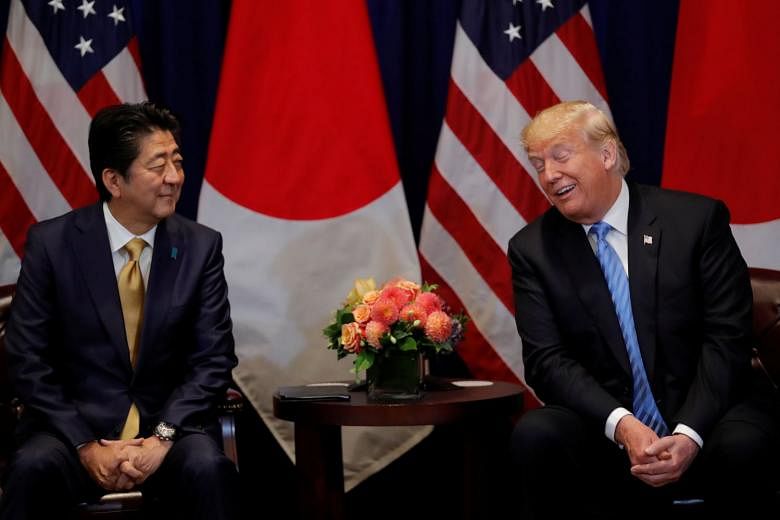NEW YORK (REUTERS) - US President Donald Trump said he had agreed with Japanese Prime Minister Shinzo Abe on Wednesday (Sept 26) to start talks on a bilateral free trade agreement that Tokyo has been resisting.
"We've agreed today to start trade negotiations between the United States and Japan," Trump said at a summit with Abe in New York on the sidelines of the UN General Assembly.
"This was something that for various reasons over the years Japan was unwilling to do and now they are willing to do. So we're very happy about that, and I'm sure that we will come to a satisfactory conclusion, and if we don't, ohhhhhh," Trump said.
Trump has made clear he is unhappy with Japan's US$69 billion (S$94 billion) trade surplus with the United States - nearly two-thirds of it from auto exports - and wants a two-way agreement to address it.
Japanese officials have been worried that Trump will demand a reduction in Japanese auto imports, and fret that Trump could impose steep import tariffs on autos and auto parts on national security grounds, which would deal a big blow to the export-reliant economy.
In a joint statement, the two countries said the talks "will respect positions of the other government," drawing lines on autos and Japan's agriculture sector.
"For the United States, market access outcomes in the motor vehicle sector will be designed to increase production and jobs in the United States in the motor vehicle industries," the statement said.
"For Japan, with regard to agricultural, forestry, and fishery products, outcomes related to market access as reflected in Japan's previous economic partnership agreements constitute the maximum level," it added, a reference to the Trans-Pacific Partnership agreement that Trump abandoned in 2017.
US Trade Representative Robert Lighthizer told reporters he is aiming for a full free trade deal requiring approval by Congress under the "fast track" trade negotiating authority law.
The law requires Congress to be notified 90 days before negotiations can begin and Lighthizer said that he will start consultations with lawmakers on Thursday.
Lighthizer said the talks would be tackled in two "tranches"with hopes for an "early harvest" from the initial talks on reductions to tariffs and non-tariff trade barriers in goods.
He declined to specify when an imbalance in autos trade would be addressed but acknowledged autos were a key goods area.
Kyodo news agency quoted Japan's economy minister, Toshimitsu Motegi, as saying that the United States would refrain from imposing new tariffs on Japanese automotive products while the talks are under way. A USTR spokesman could not immediately be reached for comment on the report.
"Actually I think we will probably come to a conclusion and I think it'll be something very exciting," Trump said.
"And Japan is very smart - great negotiators - and up until now they've done very well, and they'll continue to do very well. We're going to have a really great relationship, better than ever before on trade. I think it's going to be better for Japan and better for the United States.
"It can only be better for the United States because it couldn't get any worse because of what's happened over the years."
Japanese Economy Minister Toshimitsu Motegi was quoted as saying by Japanese media after meeting US Trade Representative Robert Lighthizer in New York on Tuesday that the two sides had reached a broad understanding over how to promote bilateral trade and may announce specifics on Wednesday.
The two top trade representatives failed at a meeting in August to narrow their differences on whether to open up negotiations for a bilateral free trade agreement.
Tokyo is worried that as part of any bilateral deal Washington might put pressure to open up its politically sensitive farm market.
The sense of unease in Tokyo increased after Trump escalated his trade fight with China, and has reportedly pushed Mexico into agree to cap auto exports to the United States.
On Tuesday, top trade officials from Japan, the United States and the European Union agreed to cooperate on steps aimed at reining in China's "non-market" economic policies, such as those aimed at technology transfers and subsidies in the form of state bank loans to state-owned enterprises. They agreed to cooperate on reforms to World Trade Organisation rules.

